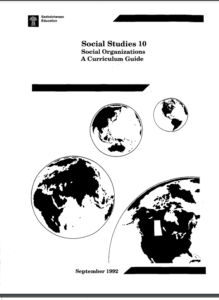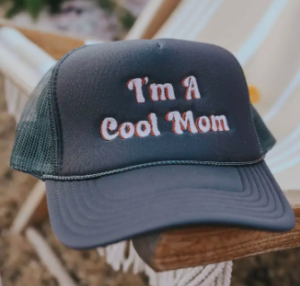Even if curriculum doesn’t update, teachers should
I took a curriculum development course in the spring that opened my eyes to the factors involved in curriculum development and, let me tell you, it was a harsh reality that I think I had been sheltering myself from believing up to that point. Some of the factors to consider are politics, heternormativity, and racism. I mean, I knew they were there but some of the concrete examples were a bit baffling. There were also some positive considerations in curriculum development like resurgence and speculation. Speculation is where this all ties into 832 because where we see technology taking education, or vice versa, is definitely uncertain but definitely something we need to consider as educators, parents, and (digital) citizens. Technology/media (or lack thereof) is a significant factor in curriculum as planned, implemented, and experienced. Additionally, the blog prompt itself mentions aspects of teaching (generational, cultural, and societal) that should be considered when planning and teaching. Generational, cultural, and societal changes in relation to education is a juggernaut of a topic, so I’ve focused my blog on this to a few key questions Alec posed.
Do we really need change and what sort of world are we preparing students for?
 In some ways, we have to go back to teaching the basics (like how to use Word, etc.) and in other ways, we need to hop on the train of change (I vow to stop teaching MLA formatting details when MLA templates exist to bypass this). If I have learned anything from my leadership courses, schools/education systems don’t change quickly enough or collectively. There is value to everyone teaching things a little bit differently, but there has to be some buy in by everyone to shift their teaching (even if slightly) for generational, cultural, and societal changes and needs. The classic and stubborn attitude of “this is how I’ve always done it” just doesn’t cut it anymore. Also, the “way we’ve always done it” is as much a falsehood as society believing they are ‘offline’ when they aren’t online, as Jurgenson points out. Generationally speaking, teaching has always shifted slightly as each year passes, whether the stubborn Stans want to admit the incremental changes or not. Maybe my thought on this is a direct reflection of being a digital native, making me more open to the opportunities tech/media provides for education even if the opportunities aren’t something I’m an expert at but willing to try. That is what my teaching reflection comes down to and plays on loop: how are my teaching practices benefiting and preparing the students in my classroom.
In some ways, we have to go back to teaching the basics (like how to use Word, etc.) and in other ways, we need to hop on the train of change (I vow to stop teaching MLA formatting details when MLA templates exist to bypass this). If I have learned anything from my leadership courses, schools/education systems don’t change quickly enough or collectively. There is value to everyone teaching things a little bit differently, but there has to be some buy in by everyone to shift their teaching (even if slightly) for generational, cultural, and societal changes and needs. The classic and stubborn attitude of “this is how I’ve always done it” just doesn’t cut it anymore. Also, the “way we’ve always done it” is as much a falsehood as society believing they are ‘offline’ when they aren’t online, as Jurgenson points out. Generationally speaking, teaching has always shifted slightly as each year passes, whether the stubborn Stans want to admit the incremental changes or not. Maybe my thought on this is a direct reflection of being a digital native, making me more open to the opportunities tech/media provides for education even if the opportunities aren’t something I’m an expert at but willing to try. That is what my teaching reflection comes down to and plays on loop: how are my teaching practices benefiting and preparing the students in my classroom.
What sort of education or education system will be needed to adequately prepare students for the world ahead?
I presume the implementation of the ‘core’ subjects was to reflect the skills needed (reading, writing, calculating, scientific observations, etc.) along with other subjects that reflect cultural, generational, and societal values (a second language, the arts, etc.). If this is the case, our current Sask education system does not directly or adequately prepare students for the world ahead (not to mention globally, bc that is a can of worms for another day). For the most part, any preparation in terms of modern skills including media/digital use and literacy is a result of hidden curriculum because curriculums are not updated frequently enough. Have you SEEN some of the dates on the Social Studies ‘curriculums’? Woof.

Anyway, a few things that I have pondered since last week’s class and the question of what the students need from the education system include:
- there needs to be deliberate times for visitor mode and resident mode for skill development in each area
- this needs to be explicitly explained and taught (the helpfulness and harm that tech does so they can manage use as informed digital citizens)
-my thought process on this is that if they are using it, they need to be taught about it; the good, the bad, and the ugly. - understanding that not being ‘online’ doesn’t mean they’re offline and that their offline time is driven by their online time (pictures/videos to take for content, understanding life through tech by being able to google something or look someone up, etc.) (the IRL Fetish)
- education will have to prove that there has been a rethinking of what creativity looks like, as Alec said in class, which has implications for all subjects and aspects of education
- I think it will introduce new subjects to be offered. There is Computer Science and Media Studies and others of the sort, but I think this will expand to provide opportunity for further digital/media literacies that will just become increasingly more important for future jobs and careers. Another reason subjects about media literacy are important is for the topics of self and public perception and identity creation/evolution, etc. in relation to aspects such as the narcissism component mentioned in class and in Foster’s article
-these ‘new’ subjects will offer cross-curricular benefits if students are given opportunity to express creativity in mediums of their choosing (like the guy who can’t drum or play piano, but creative editing made him a musician) - education has to provide opportunity for transhumanism in a variety of ways (subjects offered to highlight skills/imagination, AI as a tool for personal progress in a particular skill, etc.)
-I think this will be really important for being able to prepare higher level content or responses, which they will be able to learn from to build their skill to write for purpose or how to respond in real life. Kim gave a great example in class of getting AI to edit a real estate ad to sound more enticing and professional. Another example would be having students practice for interviews. I have a resume/letter of application assignment that is part of curriculum requirements for ELA 20 and when I go back to work, I plan on getting my 20’s to use Chat GPT to make their resumes more professional as well as practice interviewing for a position. It is a good opportunity for students to see how to use AI as a personal benefit tool and how to articulate themselves in a way that garners a response they want/need.
 Lastly, switching to my parent hat, I still struggle with the thought of my children growing up in a media as part of social life, connection, and development in terms of when to introduce it (bc its inevitable) and how to control it for healthy social and digital citizenship development. It also changes the dynamic of the parent/child relationship in new ways. Finding a balance of trust and privacy as well as involvement, as this article mentions, is tricky. It is an aspect of parenting that is new, which adds a layer to the already difficult task of parenting. Sometimes I feel like I want to take a page from Pink’s parenting and when my child shows me proof that social media is good for kids (and likewise isn’t harmful for them), they can have it. Other times, I want social media’s presence in my kids’ lives to be an open conversation with their input, like this article says. Ultimately, I have to prepare them to be successful in the world ahead whether school helps them do it or not.
Lastly, switching to my parent hat, I still struggle with the thought of my children growing up in a media as part of social life, connection, and development in terms of when to introduce it (bc its inevitable) and how to control it for healthy social and digital citizenship development. It also changes the dynamic of the parent/child relationship in new ways. Finding a balance of trust and privacy as well as involvement, as this article mentions, is tricky. It is an aspect of parenting that is new, which adds a layer to the already difficult task of parenting. Sometimes I feel like I want to take a page from Pink’s parenting and when my child shows me proof that social media is good for kids (and likewise isn’t harmful for them), they can have it. Other times, I want social media’s presence in my kids’ lives to be an open conversation with their input, like this article says. Ultimately, I have to prepare them to be successful in the world ahead whether school helps them do it or not.
Jacquie, I appreciate how you touched on the idea of incremental vs. revolutionary change. I often feel that the change required of our education system is so drastic that nothing but a complete overhaul of the entire system will be adequate to provide change. As you mention, our education system has experienced a great deal of slow, slight change over many years. It often feels like we are playing catch-up rather than being on the cutting edge. One of the things you mentioned was the idea of a greater variety of course offerings that can expand on necessary issues of media and digital literacy will be essential!